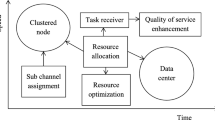Abstract
Ad hoc grids are highly heterogeneous and dynamic, in which the availability of resources and tasks may change at any time. The paper proposes a utility based resource selection scheme for QoS satisfaction and load balancing in ad hoc grid environments. The proposed scheme intends to maximize the QoS satisfaction of ad hoc grid users and support load balancing of grid resources. For each candidate ad hoc grid resource, the scheme obtains values from the computations of utility function for QoS satisfaction and benefit maximization game for ad hoc grid resource preference. The utility function for QoS satisfaction computes the utility value based on the satisfaction of QoS requirements of the grid user request. The benefit maximization game for grid resource node preference computes the preference value from the resource point of view. Its main goal is to achieve load balancing and decrease the number of resource selection failure. The utility value and the preference value of each candidate ad hoc grid resource are combined to select the most suitable grid resource for ad hoc grid user request. In the simulation, the performance evaluation of proposed algorithm for ad hoc grid is conducted.
Similar content being viewed by others
References
Abdullah T, Sokolov V, Pourebrahimi B, Bertels K (2008) Self-organizing dynamic ad hoc grids. In: Second IEEE international conference on self-adaptive and self-organizing systems workshops, pp 202–207
Abdullah T, Mhamdi L, Pourebrahimi B, Bertels K (2009) Resource discovery with dynamic matchmakers in ad hoc grid. In: Fourth international conference on systems, pp 138–144
Bertsekas D (1999) Nonlinear programming, 2nd edn. Athena Scientific, Nashua
BRITE (2010) http://www.cs.bu.edu/brite
Ercetin O, Tassiulas L (2003) Market based resource allocation for content delivery in the Internet. IEEE Trans Comput 52(12):1573–1585
Herrmann K (2007) Ad hoc service grid—self-organizing infrastructures for ambient services. Informatik aktuell. Springer, Berlin, Heidelberg, pp 299–306
Hummel KA, Jelleschitz G (2007) A robust decentralized job scheduling approach for mobile peers in ad-hoc grids. In: Seventh IEEE international symposium on cluster computing and the grid (CCGrid’07), pp 461–470
JAVASIM (2010) http://javasim.ncl.ac.uk
Katsaros K, Polyzos GC (2008) Evaluation of scheduling policies in a mobile grid architecture. In: SPECTS 2008. IEEE Press, New York, pp 390–397
Khan SU, Ahmad I (2009) A cooperative game theoretical technique for joint optimization of energy consumption and response time in computational grids. IEEE Trans Parallel Distrib Syst 20(3):346–360
Kim J, et al (2007) Using content-addressable networks for load balancing in desktop grids. In: HPDC, Monterey, California, USA, pp 189–198
Kuhn HW, Tucker AW (1951) Nonlinear programming. In: Proceedings of 2nd Berkeley symposium. University of California Press, Berkeley, pp 481–492
Li C, Li L (2004) Agent framework to support computational grid. J Syst Softw 70(1–2):177–187
Li C, Li L (2005) A distributed utility-based two level market solution for optimal resource scheduling in computational grid. Parallel Comput 31(3–4):332–351
Li C, Li L (2006) Multi economic agent interaction for optimizing the aggregate utility of grid users in computational grid. Appl Intell 25(2):147–158
Li C, Li L (2007) Utility based QoS optimisation strategy for multi-criteria scheduling on the grid. J Parallel Distrib Comput 67(2):142–153
Li C, Li L (2007) Joint QoS optimization for layered computational grid. Inf Sci 177(15):3038–3059
Luh PB, Hoitomt DJ (1993) Scheduling of manufacturing systems using the Lagrangian relaxation technique. IEEE Trans Autom Control 38(7):1066–1079
Moreno-Vozmediano R (2009) A hybrid mechanism for resource/service discovery in ad-hoc grids. Future Gen Comput Syst 25(7):717–727
Pourebrahimi B, Bertels K (2008) Adaptation to dynamic resource availability in ad hoc grids through a learning mechanism. In: CSE ’08: proceedings of the 2008 11th IEEE international conference on computational science and engineering, pp 171–178
Pourebrahimi B, Bertels KLM (2008) Auction protocols for resource allocations in ad-hoc grids. In: Proceedings of 14th international Euro-par conference, Las Palmas de Gran Canaria, Spain, August, 2008. Springer, Berlin, pp 520–533
Pourebrahimi B, Alima LO, Bertels K (2008) Market formulation for resources allocation in an ad-hoc grid. In: Second IEEE international conference on self-adaptive and self-organizing systems workshops, pp 254–259
Scriven I, Lewis A, Smith M, Friese T (2008) Resource evaluation and node monitoring in service oriented ad-hoc grids. In: Proceedings of the sixth Australasian workshop on grid computing and e-research, pp 65–71
Selvi VV, Sharfraz S, Parthasarathi R (2007) Mobile ad hoc grid using trace based mobility model. In: Cérin C, Li K-C (eds) GPC 2007. LNCS, vol 4459. Springer, Berlin, pp 274–285
Shivle S, Siegel HJ, Maciejewski AA, Sugavanam P, Banka T, Castain R, Chindam K, Dussinger S, Pichumani P, Satyasekaran P, Saylor W, Sendek D, Sousa J, Sridharan J, Velazco J (2006) Static allocation of resources to communicating subtasks in a heterogeneous ad hoc grid environment. J Parallel Distrib Comput 66(4):600–611
Smith M, Friese T, Freisleben B (2004) Towards a service-oriented ad hoc grid. In: Proceedings of the third international symposium on parallel and distributed computing. IEEE Press, New York, pp 201–208
Author information
Authors and Affiliations
Corresponding author
Rights and permissions
About this article
Cite this article
Li, C., Li, L. A resource selection scheme for QoS satisfaction and load balancing in ad hoc grid. J Supercomput 59, 499–525 (2012). https://doi.org/10.1007/s11227-010-0450-y
Published:
Issue Date:
DOI: https://doi.org/10.1007/s11227-010-0450-y




